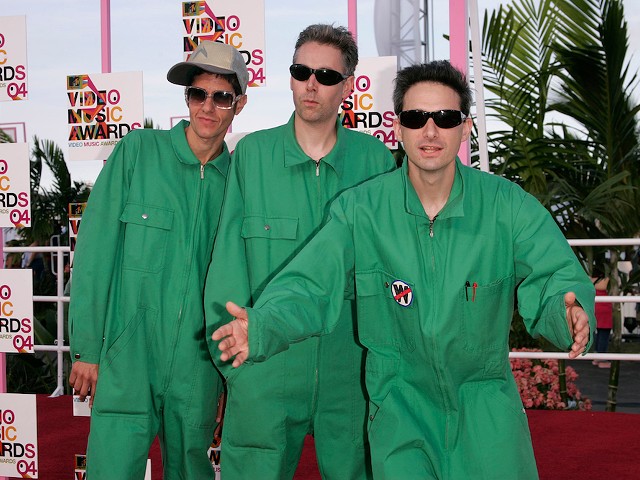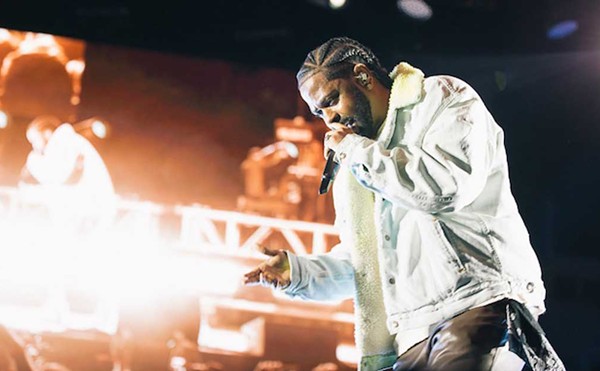Chloë Drallos is ready to talk, if you're ready to listen. While some of what the songwriter-guitarist might sing to you might come off caustic in its candor, there's often a universally applicable message in her lyrics touting the self-empowerment that's attainable when we disentangle ourselves from petty bullshit.
Drallos, a.k.a. Zilched, released an EP and a handful of singles over the last three years, but this weekend, she's unveiling her first full-length (via Young Heavy Souls), titled Doompop.
"And I picked that title more than a year ago, so this definitely isn't a quarantine album, or any kind of commentary," she says. To an extent, the intent is almost for the title to be sort of a pick-me-up. Rather than wallow in gloom and nihilism and heaviness, Drallos has made an album that promotes a sort of mental social distancing, if you will, from the anxieties or insecurities of the coming-of-age years, when we're navigating the judgmental whims of cliques and cool crowds, or even our families.
"Doompop" was a catchphrase, of sorts, that Drallos traded off with some musicians she'd previously collaborated with, over a shared appreciation for heavier, louder, gnarlier music. But when it comes to the aerodynamic blend of shoegaze and goth that's sweetened (if not bitter-sweetened) by Drallos' threading some substantial earworm vocal melodies with her signature hazy mid-range croon, then, yes — "doom plus pop" seemed to fit nicely.
But a lot of that sentiment came from a conviction to work through the doom — to "face the heavy," as she puts it, and then essentially put that heaviness behind you. The loudness of the guitars, the litheness of the melodies, and the propulsion of the drums all manifest a sense of levitating above the heavy — off-lifting the burden and digging up out of the doom.
"'Heavy' doesn't have to mean bad, or dark, in this instance," Drallos says. And while some of her formative musical touchstones may have been from the uber-subversive punk side of things, "I'm not pro-fuck the world," she says, and hopes people don't fixate on that doom. "Because I'm still a pretty positive person, actually, or at least, that's what I think you should put out, even if I'm not always following that," she says. "I have put a lot of bad feelings into (the lyrics), but I feel like every song has a bit of a resolution in response to the negative, usually concluding that, 'Yeah, that was bad, but it really doesn't matter in the end.'"
She adds, "This record is just about growing pains — all of the growing pains that I actually sprang upon myself because I was trying to grow up too fast."
Some of us figure out who we are and what we like at an earlier age than others — and for Drallos, that inadvertently generated a lot of friction, awkwardness, and fall-outs between her and her friends. She grew up in the rural (and often conservative) milieus of Livingston County — and when you're a teenage girl growing up in a place like that, being essentially radicalized by Bob Dylan's nonconformity, enchanted by the distortion of Jesus & Mary Chain, comforted by the avant-eccentricities of David Lynch, and questioning organized religion? Then, yeah ... it might tempt ostracization.
She was, initially, the outsider by accident. "I was always the weird one that didn't want to be the weird one in a group of friends," she says. "I didn't want to actually be weird. I was just different than the people I was surrounding myself with. I was faced with rejection, but I started to find representation in someone like Courtney Love. Everyone around me loved Kurt (Cobain) and was like, fuck HER ... but I kinda liked her. And to see that you could be hated but still be great? That was exciting to me! 'Cause I did feel actually hated for a bit. That's when I started to feel close to artists like (Love), and David Lynch with Twin Peaks, and also John Waters and all of his stuff, which felt like it was a universe where everything that everyone else hated was normal and celebrated, and those characters were weird, but that it was normalized and accepted."
She adds, "I feel like I'm a person that just invites preconceived notions. I'm used to it at this point. People presuming that I think I'm too cool? Or people thinking I'm not cool at all? Maybe I should stop projecting ... but I feel like Zilched has been my space where I find my normal. This is my little world [where] anything that anyone else doesn't like is exactly what makes this work."
Working with producer Ben Collins (in Ypsilanti), Drallos's voice soars to the top of the mix, despite the fiery feedback and heavy, roaring reverb underneath. On songs like "The Morning," there are veritable tidal waves of cresting distortion and power chords, and it feels like a cathartic sort of cauterizing of a wound. But there is a melody and a hook, and a beat that carries everything forward. "The Morning," just like several of the songs on this album, are toeing the line of ballad-territory — the pop elements are verifiably glowing beneath the murk and the clamor, and that's intentional.
Drallos has had some write-ups from outlets over the last couple of years, but they've tended to fixate over references to either Courtney Love or maybe Sonic Youth, or any other quickly packaged references for fast familiarity to communicate that her music has sheens of atmospheric noise and frenetic guitar phrasings, but there's actually much more nuanced to her musical DNA. While she still may only be in her early 20s, she's been writing music for a decade now. And it can't be understated that she experiences the emotions of music, and the emotions of songwriting in general, very intensely.
"I can tend to get wrapped up in the personal side of things," Drallos says of her lyrics. "I'm self-taught on guitar, so I'm not as technically talented as some — so that means that (Zilched music) is pretty much all my own personal expression."
This is probably the key reason why Drallos has opted to keep the band's lineup comparatively loose and fluctuating. "At the end of the day, the sound, and everything (about Zilched) is just a mix of my favorite things. But I bet that anyone out there who doesn't take everything as personal as I might probably hears this and says, Oh, God, loosen up!"
She adds, "Writing a song like 'The Morning' was very therapeutic because I looked at what was going on in my life and my friends and asked why, why was I getting so upset about it, if, in the end, I really didn't care. I don't want to be like those people who are rejecting me, anyway. So I need to not care."
In the end, Doompop becomes empowering because it not only encourages us to look, head on, at what's making us sad, but more than that — asking why, whatever it might be, is it making us sad? Why even let it? And how do we let go of all that heavy?
Zilched's Doompop is available Friday. Chloë Drallos is joined by a full band and will perform a livestream concert at 8 p.m. on Saturday, Oct. 24 at facebook.com/zilchedmusic. More information is available at zilchedmusic.bandcamp.com.
We have a new events newsletter! Find out the best things to do in the area every Thursday in your inbox.





